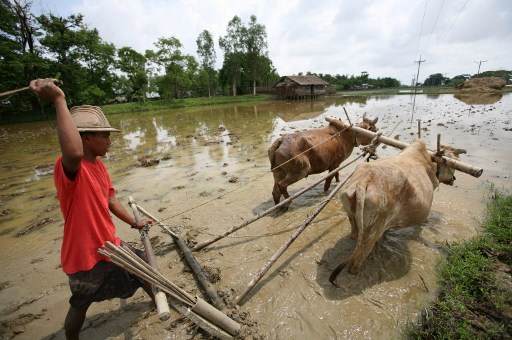The Myanmar Rice Federation (MRF) has stressed a need for tangible rice policies to keep abreast with industries in neighbouring countries.
A longstanding ban on private rice exports was scrapped in 2010 under the former military junta, but the modernization needs of Burma’s agricultural sector remain vast. The world’s largest rice exporter from 1961 to 1963, Burma’s output today lags vastly behind that of its neighbours. And unlike those neighbours – countries such as Thailand, Vietnam, India and China – Burma lacks a comprehensive set of rules governing foreign investment in agriculture and the export of the country’s most important crop.
Ye Min Aung, general-secretary of the MRF, said adopting more comprehensive rice policies will allow foreign investors to make their own decisions freely on which areas to invest – such as seed production, rice milling or industrial farming.
“The policy, to ensure sufficient domestic production and export the surplus, is rather too general and we rice millers need more precise and strategic policies specifying roles of rice millers, traders, companies and farmers as well as the insurance system and many more,” said Ye Min Aung.
He said the MRF will cooperate with the government, international organisations and civil society groups to work out new rice policies.
“A plan has been underway to draft new rice policies under supervision of the MRF which will be presented to the President and the public, as well as political parties and civil society organisations for their input and advice,” he said.
[related]
India – currently the world’s largest rice exporter – shipped an estimated 10.15 million tons abroad in fiscal year 2012-13. Burma can barely keep up with domestic demand, producing an estimated 12.7 million tons over the same period, with consumption hovering at around 11.7 million tons.
Soe Tun, chairman of the Farmers Association, said the new policies need to be inclusive and represent everyone in the rice sector in order to be successful.
“We see that having the policy will contribute to development of the rice industry as we will be able to gauge where to focus knowing who’s going where, and we would like to urge for the inclusion of representatives from all sectors and organisations in making a draft of the policy,” said Soe Tun.
In the short-term, Burmese rice exports face a competitive challenge from an old foe – Thailand. In October 2011, the Thai government, under current Prime Minister Yingluck Shinawatra, launched a controversial “rice-pledging scheme” to raise rural incomes and win votes, offering farmers as much as 50 percent more than market rates for their crops.
While agriculture subsidies are common across Southeast Asia, the Thai rice-pledging scheme came with a twist: in an effort to leverage the Kingdom’s position at the time as the world’s biggest rice exporter, Bangkok sought to limit exports and put the bulk of the country’s production into strategic reserves. The policy was premised on the notion that the global price of rice would increase drastically without a steady supply of Thailand’s finest, allowing the country to reap a windfall later on.
It didn’t work. Competing producer nations filled in the gap, keeping prices relatively stable. Thailand’s pledging scheme is scheduled to expire next month, but owing to the election recently held and the Thai government’s current “caretaker” status, it cannot finance the debts owed to farmers under the scheme by further borrowing.
In an effort to recoup some of the estimated US$4.4 billion in losses incurred by the scheme, Bangkok is likely to dump excess stores on the international market in the near future, undercutting competitors and causing the global price of rice to plummet. While Yingluck enjoys widespread support in the country’s agrarian heartland, the failure of the rice-pledging scheme may fatally weaken her embattled government if it fails to compensate farmers at agreed-upon rates.
For Burma’s rice industry, the rice-pledging scheme has been a mixed blessing. Anti-government protestors have claimed that low-quality rice from Burma and Cambodia has been smuggled across borders into Thailand in an effort to cash in on the subsidies. Smugglers along the Thai-Burmese border have benefited as well, earning a premium in Burma for rice siphoned from official stores in Thailand.
The ASEAN economic community, or AEC, is scheduled to go into effect in 2015, marking the first tenuous steps to create an ASEAN-wide common market. Agriculture has historically been among the most protected sectors in the region, so it is unlikely that Burma’s farmers will be overwhelmed by foreign producers right away.
In 2008, the Shinawatra-linked prime minister of Thailand, Samak Sundaravej, proposed forming an ASEAN-wide “rice cartel”, allowing Southeast Asian producers to demand better and more uniform prices for their rice on the international market. Such a scheme may eventually be incorporated into the AEC as efforts to remove barriers to regional trade progress.



